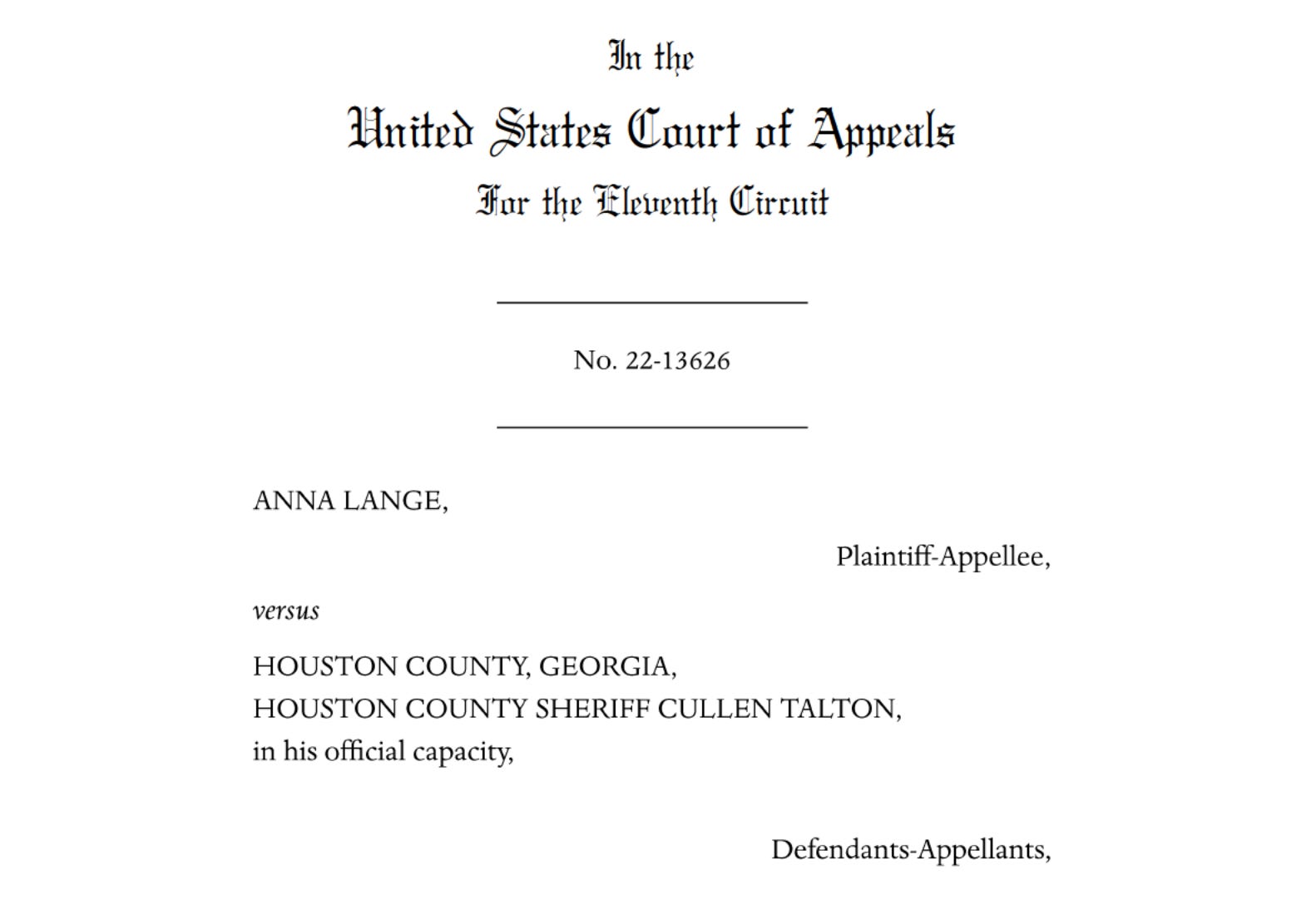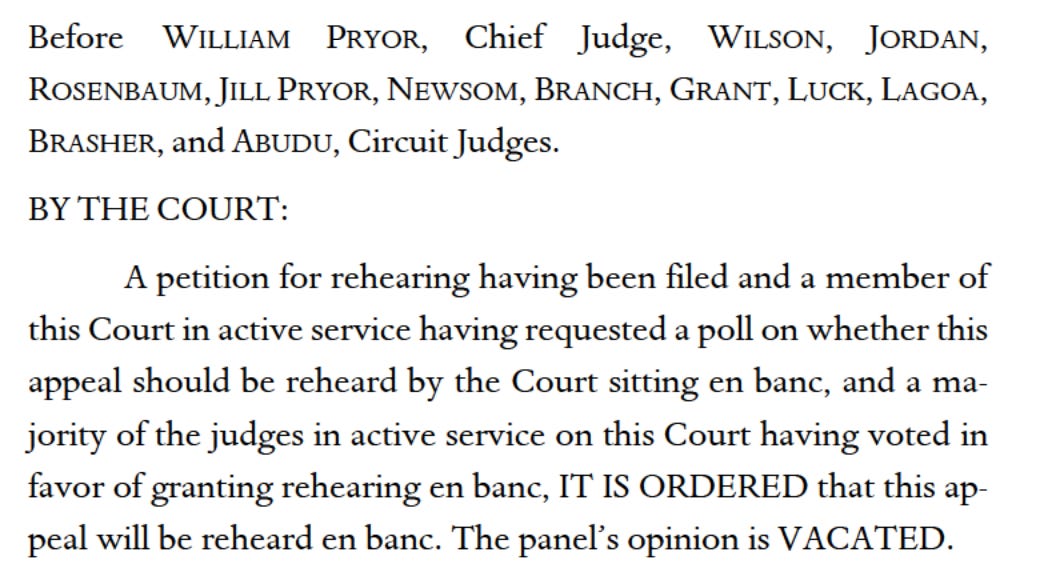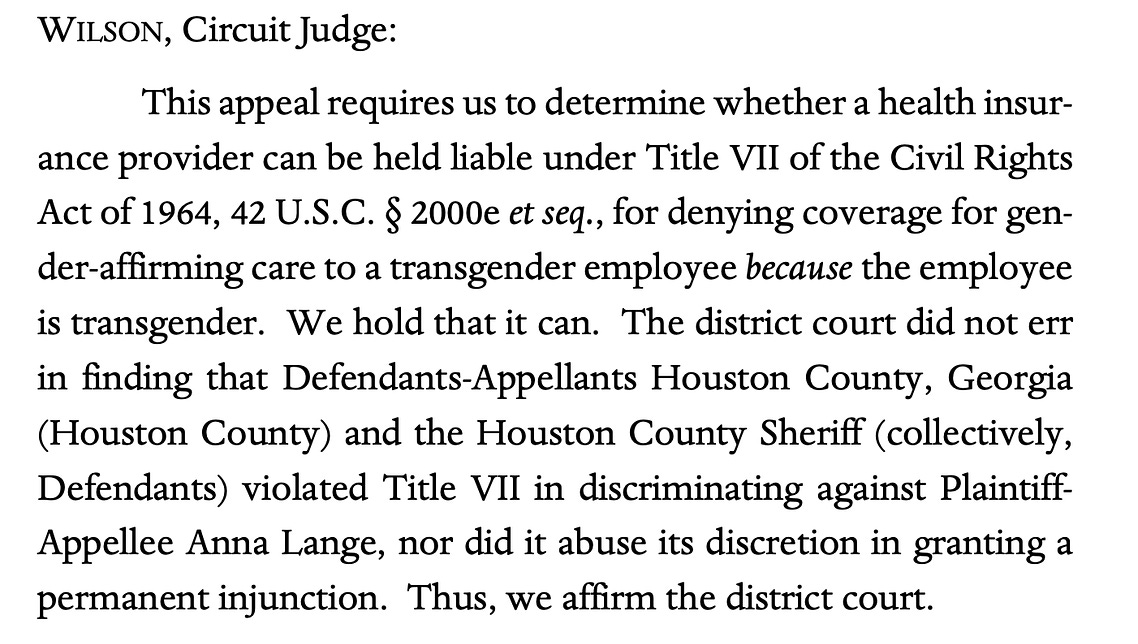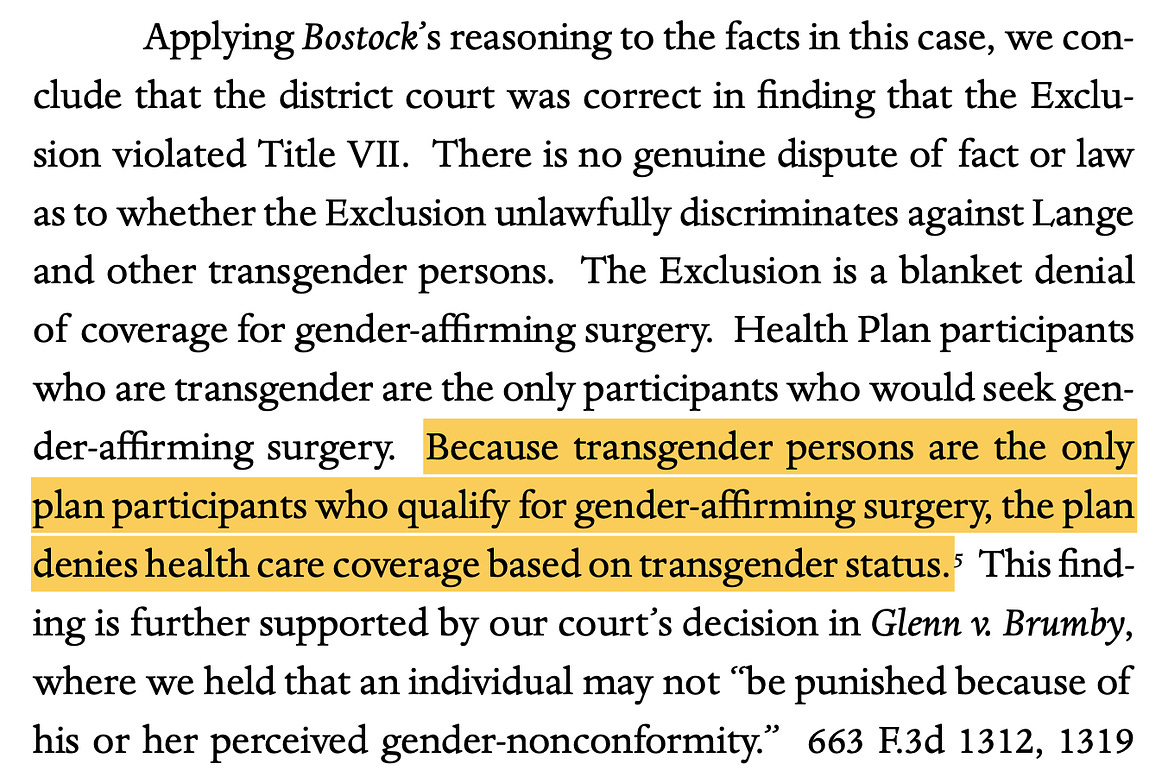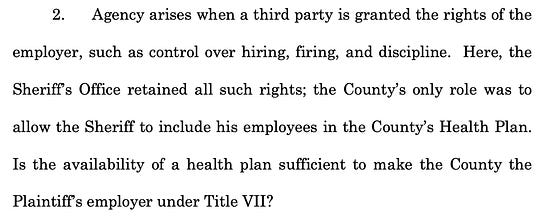Thank you for being one of more than 35,000 people supporting Law Dork with a free subscription! I am so grateful to everyone for reading, subscribing, and sharing Law Dork. That said, my independent legal journalism — like today’s report on the Eleventh Circuit — does cost money to produce. Please consider a paid subscription, as little as $6 a month, to Law Dork today. If you do that, you’ll receive bonus features available only to paid subscribers — and support this essential reporting. I know that not everyone can afford it or prioritize a paid subscription, and, if that’s you, I am so glad you are here! Thanks, Chris Full Eleventh Circuit agrees to reconsider case over trans healthcare exclusionsA three-judge panel sided with the transgender employee in her lawsuit in May, but now the full — and more conservative — court agreed to reconsider that ruling.On Thursday, the U.S. Court of Appeals for the Eleventh Circuit signaled an interest in restricting civil rights protections for transgender people even further than the conservative southern appeals court has already done. In a brief order, the full court announced that it granted the request by Houston County, Georgia, to rehear a case over whether a county can be sued under Title VII of the Civil Rights Act of 1964 because its insurance policy excludes gender-affirming surgery for a transgender woman, Anna Lange. As Judge Charles Wilson, a Clinton appointee, wrote for the 2-1 panel in May, “We hold that it can.” In his relatively brief 15-page opinion, Wilson upheld the district court’s decision finding that the exclusion violates Title VII though its “plain discrimination against Lange because she is transgender.” Lange, who has worked for the Sheriff’s Office since 2006, was formally diagnosed with gender dysphoria in 2017. After informing her employer that she would be living as a woman, the vaginoplasty later deemed medically necessary by her healthcare providers was denied under the exclusion and she sued under Title VII. The panel upheld a lower court’s decision that the county could be sued for the discriminatory exclusion. Thursday’s order, however, means that a majority of the full court voted to revisit the May decision. This is a particularly concerning development for Lange and her claim — and others like it — given the en banc court’s 2022 decision upholding an anti-trans restroom policy at a Florida school and the 2023 decision of a three-judge panel holding that Alabama’s ban on gender-affirming medical care for minors is likely constitutional. The full court has seven Republican appointees and five Democratic appointees. Of potential significance, Wilson has announced that he will be taking senior status upon the confirmation of his successor. The nomination of Embry Kidd, a magistrate judge in Florida who was nominated by President Joe Biden to take his place earlier this year, is pending with the full Senate following the Senate Judiciary Committee’s favorable reporting of his nomination on July 11. A spokesperson for a senior Democratic senator told Law Dork that Kidd is one of five circuit court nominations and 16 district court nominations pending before the full Senate currently. Before the three-judge panel in Lange’s case, Wilson — joined by Judge Jill Pryor, an Obama appointee — wrote that the discrimination Lange faced due to the exclusion policy was obvious and a simple case in light of the U.S. Supreme Court’s 2020 decision in Bostock v. Clayton County. In Bostock, Justice Neil Gorsuch wrote for the 6-3 court that Title VII’s sex discrimination ban includes bans on sexual orientation discrimination and gender identity discrimination. Looking at Lange’s case in light of that, Wilson wrote: As was cited to by Wilson, the U.S. Court of Appeals for the Fourth Circuit reached a similar conclusion in April, on an 8-6 decision, when that court, sitting en banc, considered whether similar exclusions violate the Equal Protection Clause or federal law. Additionally, the Glenn v. Brumby case cited by Wilson is important. That is a 2011 decision from the Eleventh Circuit in which a unanimous three-judge panel concluded in Vandy Beth Glenn’s case against the Georgia General Assembly’s Office of Legislative Counsel that “a government agent violates the Equal Protection Clause’s prohibition of sex-based discrimination when he or she fires a transgender or transsexual employee because of his or her gender non-conformity.” Notably, Judge William Pryor — a conservative George W. Bush appointee who used to be the attorney general of Alabama — was on that panel and joined that decision, which was written by Judge Rosemary Barkett, a Clinton appointee who left the court in 2013 and now sits on Iran–United States Claims Tribunal in The Hague. In short, this concept — even among conservative judges in the deep South — was not particularly controversial more than a decade ago. It was only once social conservatives decided to “other” and attack trans people in law and in the courts that the legal ground even became questionable. And yet, when faced with Lange’s complaint against Houston County, Judge Andrew Brasher, a Trump appointee, went through linguistic gymnastics to ignore the logic of Bostock and Glenn. In his May dissent, he wrote:
Later, as to Bostock specifically, Brasher wrote:
Now, the full court is going to consider whether to make that argument law. Although that is the main issue in Lange’s complaint, a secondary question on appeal could become an issue before the en banc court: whether the county is liable as an employer under Title VII for the exclusion. A ruling against Lange on that ground might not directly restrict transgender rights, but it could still have an indirect negative effect — and could restrict other nondiscrimination claims. In his May opinion, Wilson rejected the idea that the county should not be held accountable for its health insurance plan. As Wilson wrote, “The Supreme Court has made clear that ‘there is no reason to believe that Congress intended a special definition of discrimination in the context of employee group insurance coverage,’” quoting a 1978 Supreme Court decision. While the county very well might just be “taking advantage of an existing health insurance plan” that had the anti-trans exclusion, Wilson concluded, that “does nothing to absolve Houston County of agency liability.“ In its petition seeking en banc review, the Georgia county raised that conclusion as a second issue to be considered by the full court. Thursday’s order from the Eleventh Circuit did not state on which basis or bases it would be considering the case en banc, so expect this issue to be a part of the rehearing consideration. You’re a free subscriber to Law Dork, with Chris Geidner. To further support this independent legal journalism, please consider becoming a paying subscriber. |

